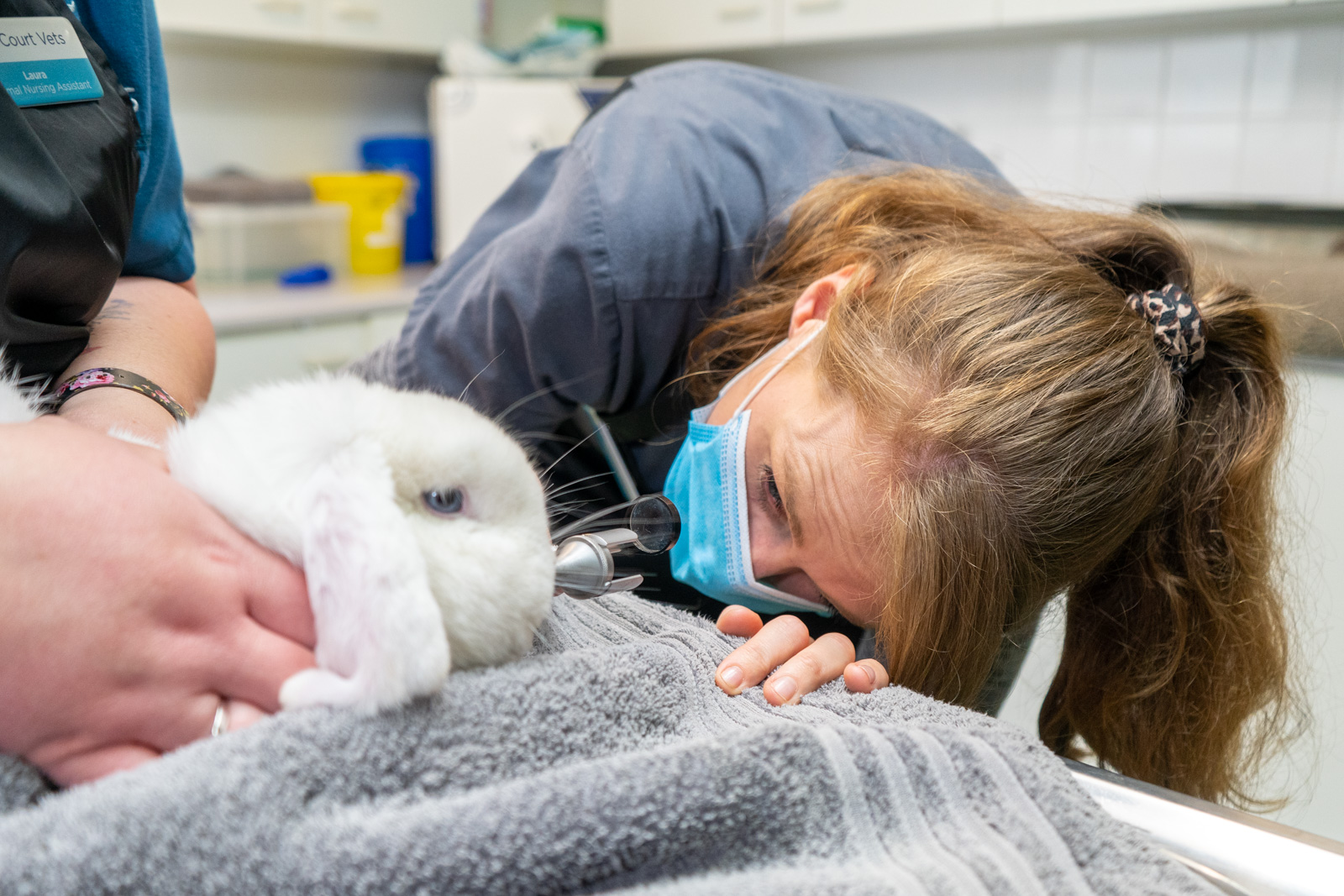Last Updated: 30/10/24
For many of us, our rabbits are family members, and it can be distressing if they become unwell or injure themselves.
It’s always sensible to have a plan in place should your rabbit require unanticipated treatment. One option is pet insurance which can offer a potential solution, but your vet is always here to help you no matter what your situation.
There are lots of policies available, from simply ‘accident only’ cover to lifetime policies. ‘Cover for life’ policies tend to offer the most comprehensive cover.
Choose your policy carefully, read the small print and check whether the policy imposes a premium increase policy after a claim has been made.
On this page:
- Is pet insurance for your rabbit worth it?
- What types of insurance policies are available?
- Lifetime or ‘cover for life’ policies?
- What is an excess?
- What sort of things are covered by pet insurance?
- What if my rabbit already has a health condition?
- Can I change from one policy to another?
Is pet insurance for your rabbit worth it?
Some rabbit owners choose to put aside some money each month for unexpected costs rather than taking out an insurance policy (this is basically self-insuring). This takes ongoing commitment, and often takes time to grow to a level where significant costs can be covered.
It is therefore important to fully consider all eventualities and whether taking out a pet insurance policy might be a safer option.
Covering unexpected costs
When deciding whether to take out pet insurance, the best place to start is assessing whether you would be able to fully cover unexpected veterinary costs if they arose.
While we all hope our rabbits will remain healthy and well, many of us have no idea of the costs involved in managing certain health conditions, and this can come as a shock!
If your rabbit gets a serious digestive issue such as a blockage or gets ileus (also known as ‘gut stasis’, where their digestive tract stops working), hospitalisation and treatment of these conditions can cost hundreds to thousands of pounds.
Similarly, advanced imaging using a CT scanner for ongoing ear issues, for example, can cost between £1500 to 2000.
Pet insurance can reduce our stress in these situations, by giving us the knowledge that these costs can be met and that we are able to access the full array of treatment options.
Veterinary Nurse Emma (RVN CVPM PgCert – VBM) says:
“I always recommend pet insurance; from personal experience, it takes the financial worry out of a very emotional situation. Knowing you don’t have to worry about the bill, allows you to concentrate on helping your pet recover.”
What types of insurance policies are available?
Time limited policies
These policies cover accidents and illnesses usually over a 12-month period or until the end of the policy year. However, at the end of the policy period any conditions previously claimed for are likely to then be excluded (and therefore not covered) by any further policies taken out, regardless of whether you stay with the same provider. There is usually a maximum benefit for each illness or injury
Condition Limited
These policies offer a maximum benefit per condition. Once the maximum is reached irrespective of timeframe you can no longer claim on that condition.
Lifetime or ‘cover for life’ policies?
Most will provide a set amount of cover that will be paid for illness or injury; these may reset annually or end when the maximal limit is reached. This may or may not be the lifetime of your rabbit.
Did you know?
Many insurance policies will not cover any illnesses which occur in the first 14 days of the policy being taken out. All policies are different, but it is good to be aware of this and always read the small print!
What is an excess?
The term ‘excess’ refers to the amount of money you are expected to cover yourself when needing to make an insurance claim.
When taking out a pet insurance policy for your rabbit, it is important to check what sort of excess applies.
How is excess charged
Some excesses will involve a fixed charge per insurance claim made, others will be worked out as a percentage of the claim being made and some may have both.
There can be a considerable price difference between these options, so it’s important you know the ins and outs of the policy you are taking out.
It is also worth bearing in mind that the amount of excess you are required to pay may change as your rabbit gets older.
For example, once your rabbit reaches a certain age some providers will add a 20% excess (on top of your standard fee), if you need to make a claim.
What sort of things are covered by pet insurance?
The specific costs covered by pet insurance will likely vary between policies, but examples of the possible costs covered include:
- Veterinary fees (excluding routine treatments)
- Other supportive care (e.g. supplements and acupuncture)
- The costs involved if your rabbit goes missing (e.g. advertising fees)
- Boarding fees (e.g. if you are hospitalised)
- Dental cover (most policies exclude rabbit dental care, so always read the policy thoroughly)

What doesn’t rabbit pet insurance cover?
- Some insurance providers do not offer cover to rabbits under eight weeks or over five years of age.
- Typically, insurance will not cover routine vet fees (for example, vaccinations or neutering) or pre-existing conditions.
Thoroughly research the different insurance policies available, and find the one that is best tailored to you and your rabbit’s individual needs.
Always read the small print and query anything you aren’t sure about before committing to a policy.
Before committing to a pet insurance policy make sure you know:
- What you are eligible to claim for
- Will the policy premium increase with each claim (ask for an example)
- The maximum cost you can claim and over what period
- What restrictions, if any, apply
- Whether the policy will be subject to any change as your rabbit gets older
What if my rabbit already has a health condition?
You can still take out insurance for your rabbit, even if they have a pre-existing health condition, however, any existing health issues need to be declared and will likely be excluded from the policy.
Not notifying the insurance company of any pre-existing health issues can invalidate your policy.

Can I change from one policy to another?
It is often possible to do this, however, if your rabbit has an ongoing health issue or you have made claims on your existing policy, you may find that other insurers will only offer policies which exclude pre-existing issues or conditions you have already claimed for.
The ability to transition between policies can also be dependent on the age of your rabbit.
If you are unsure of the potential costs of veterinary treatment or would like more information about pet insurance, then please reach out to your local veterinary practice for further advice.

